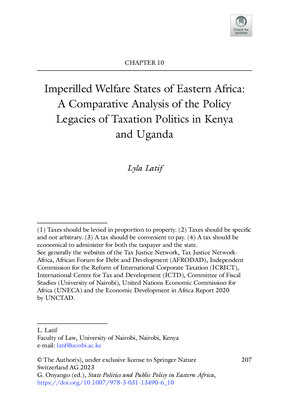The Lure of the Welfare State following Decolonisation in Kenya

The chapter argues that historical inequalities in the design of the tax system have been buffered against subsequent change by the post-colonial states because of the imperial vision set out through the Organisation for Economic Co-operation and Development (OECD) of keeping former colonies subordinate to European political and economic needs. The post-colonial focus on revenue mobilisation in order to finance domestic economic growth put pressure on the newly independent state to identify its own sources of revenue, failing which it would resort to borrowing from its previous colonisers. The debt conditions shaped the ordering of a domestic economy dependent on international financial institutions of the OECD that were heavily inclined towards revenue extraction and capital flight. Effectively, the colonial tax model that prioritised a fiscal system based on supporting the (global) economic market over welfare was thus entrenched. Taxation continues to be viewed as the fiscal tool to support private sector growth and foreign direct investment upon which welfare would be contingent.
